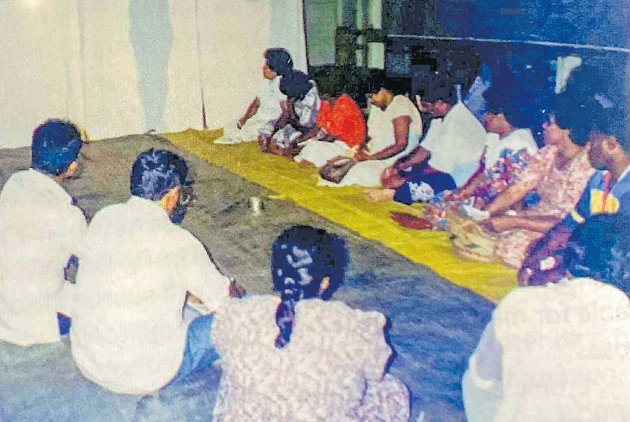FIJI was still reeling from the seismic political rupture of the 1987 coups. The promise once spoken by Pope John Paul II, that Fiji was “the way the world should be” seemed, at least temporarily, broken.
Fr Frank Hoare, having spent four years abroad in study, returned home to a nation shadowed by suspicion, grief, and fracture.
With the death of deposed Prime Minister Dr Timoci Bavadra, tensions flared again. Trust, once so easily assumed, now had to be slowly and deliberately rebuilt.
But Fr Hoare was not returning to continue as before. With degrees in psychology and social anthropology behind him, and with the Columban Society naming reconciliation as its post-coup mission priority, he came not just as a priest but as a bridge builder.
The tea that burned and healed
In a lecture hall on 9th March 1989 at the University of London, Fr Hoare listened intently as a fellow anthropologist shared a story from Lomaiviti.
A Fijian husband, newly married, had continued his bachelor ways, drinking grog till dawn, rising late, and expecting breakfast to be served at his leisure.
The wife, quietly subversive, served cold tea. He threw it in her face. Day after day, cold tea. Day after day, thrown.
Until one morning, the tea was hot. The husband laughed. The wife laughed. A moment of violence became, strangely, a moment of union.
“That’s when real love began between us,” the man had said.
The anthropologist explained: while veidomoni, romantic love, is rooted in Fijian equality, marriage follows a hierarchical model, with husband as chief. This structural clash often causes quiet confusion in couples.
When both finally accept the roles expected by tradition, the tension dissolves. The laughter, however ironic, signals peace.
Fr Hoare left the lecture pondering how love, in many cultures, is shaped not just by emotion but by structure, power, and patience.
First Fijian, then Christian
Its January 1990 and by now back in Fiji, Fr Hoare and fellow Columban Fr Dick Keelan had co-founded People for Intercultural Awareness, a grassroots initiative promoting understanding between Indigenous Fijians and Indo-Fijians.
They were joined by Rev Paula Niukula, a former president of the Methodist Church and a courageous voice for unity.
At one workshop, a Fijian Brother stood and declared: “I am Fijian first, and Christian second.”
The room went silent. For some, it was an honest confession. For others, a dangerous inversion.
Fr Hoare realised: the coup had not only split a nation, it had split identities. Faith and ethnicity were no longer easy companions.
But if some voices embraced division, others resisted with quiet conviction:
A Christian man in Votua blocked angry villagers from attacking a Sikh neighbour, saying: “We are Christians.”
At a Suva bus stand, a gang of men threatened Indo-Fijians, until Sunia Cama, a former heavyweight boxing champion, stepped in front of them.
“You’ll have to go through me first.” They didn’t.
The beef that broke the bond
Having lived in India during the late 1970s, Fr Hoare had come to understand the sacred role of the cow in Hinduism, its milk, dung, and labour seen as maternal gifts.
“How could one eat one’s own mother?” he had once been told.
When he returned to Fiji to work primarily with Indo-Fijians, he chose to become vegetarian. It was a small sacrifice, but a meaningful gesture of cultural solidarity.
Years later, during a prayer meeting at a rural Catholic home, a young Hindu man approached him “Are you still vegetarian?”
Fr Hoare explained that while in Ireland, he had resumed eating meat, a decision partly prompted by his mother’s struggle to accommodate his diet.
The young man nodded, then turned and announced to his family:
“Father eats EVERYTHING!”
The tone was innocent, but the emphasis stung. The implication was clear: he eats beef.
Once again, Fr Hoare found himself caught between cultural hospitality and religious offence. Quietly, he resolved “I will eat meat, but not beef.”
Wounds and blessings
In the aftermath of the coup, the lines between “us” and “them” deepened. Indo-Fijians were stereotyped as selfish individualists; Indigenous Fijians as lazy and entitled. Both caricatures, though false, were repeated enough to gain power.
Ethnic prejudice became a tool, sharpened by those in power to fracture communities and maintain control.
Yet Fr Hoare saw something else happening, too, small, stubborn acts of reconciliation. Courses. Conversations. Meals shared. Stories told.
He remembered the Biblical story of Jacob wrestling with the stranger, wounded in the night, blessed by dawn.
“In struggling to be inclusive of people of other cultures and faiths, we come to know and love God better,” he wrote.
It was in this wrestling, not in comfort, that the soul of Fiji would be forged.



